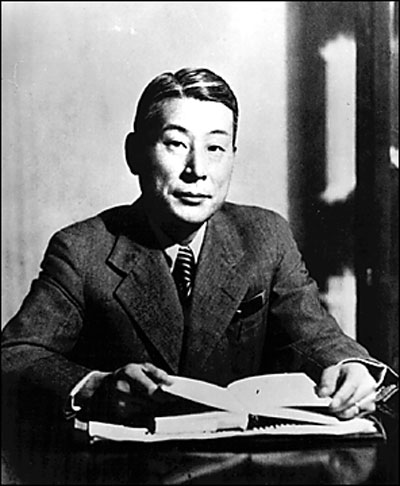The Japanese bureaucrat who saved thousands of Jewish lives

In June 1940, Germany occupied or controlled most of Europe, including Belgium, Denmark, Holland and Norway. France fell in June. Towards the Eastern front, the Soviet Union had annexed Lithuania. It was only a matter of weeks before the Nazis would invade and the the thousands of Jewish people already living in Lithuania plus refugees from the surrounding countries were desperate to escape.
Chiune Sugihara was the vice consul of the Japanese consulate in Kaunas, Lithuania’s second-largest city, at the time. The consulate was soon to be closed and he had been ordered by Tokyo not to issue any visas to Japan. In late July, the bureaucrat, who had always quietly done his job without causing any trouble, found hundreds of people at the gates of his office. They had managed to obtain entry visas to the Caribbean island of Curaçao, but needed transit visas through Japan.
Having heard of the atrocities of the Nazis in other parts of Europe, Mr Sugihara decided to disobey his orders and help those he could. The decision was not made lightly – after all, he wass not only betraying his country, but his nation’s allies too. After days of agonising, the Japanese official spoke to Soviet officials who agreed to let the Jews travel through the country via the Trans-Siberian Railway at five times the standard ticket price.
Then Chiune Sugihara started writing visas.
Throughout the month of August he did not stop, painstakingly writing each life-saving visa – by hand. According to biographers Mr Sugihara spent up to 20 hours a day on the visas and was still working on them while in transit from his hotel to the train station. As he boarded the train that would take him and his family out of the country, he was signing blank pieces of paper and stamping them with the consulate seal, and flinging them into the gathered crowd of people.

Before the train left, he said, “Please forgive me. I cannot write any more. I wish you the best.”
Then he bowed deeply and someone cried out, “Sugihara. We’ll never forget you!”
Within a month, Mr Sugihara issued 2139 visas, some of which gave passage to whole families who would otherwise have been captured and most likely killed by the Nazis. It is believed this single man saved 6000 people before the Soviets ordered him to close the consulate. By this time, most of the individuals and families he helped would have made it to Japan.
It is estimated up to 80 percent of the Jews remaining in Lithuania were killed in the Holocaust.
Four decades after the war, when asked why he did what he did, Sugihara said they were human beings and they needed help: “You want to know about my motivation, don’t you? Well. It is the kind of sentiments anyone would have when he actually sees refugees face to face, begging with tears in their eyes. He just cannot help but sympathize with them. Among the refugees were the elderly and women. They were so desperate that they went so far as to kiss my shoes.
“People in Tokyo were not united. So, I made up my mind not to wait for their reply. I knew that somebody would surely complain about me in the future. But, I myself thought this would be the right thing to do. There is nothing wrong in saving many people’s lives…. The spirit of humanity, philanthropy…neighbourly friendship…with this spirit, I ventured to do what I did, confronting this most difficult situation—and because of this reason, I went ahead with redoubled courage.”
Mr Sugihara was reassigned to Berlin and was eventually captured by the Soviets. Along with his family, he spent 18 months in a prisoner-of-war camp before being deported to Japan. Back home, he was asked to resign from public service, allegedly due to downsizing of his department, although his wife maintained it was due to the “Lithuania incident”. He took a series of low profile jobs to support his family, including a stint as a lightbulb salesman.
In 1985, Israel named this little-known hero to the Righteous Among the Nations for his actions, the only Japanese national to be so honoured. Several streets are named after him, in Lithuania and Israel, and a memorial was built in Los Angeles, which depicts a life-sized Sugihara seated on a bench, holding a visa in his hand. It is accompanied by a quote from Jewish text the Talmud: “He who saves one life, saves the entire world.”
Chiune Sugihara died in 1986.
Had you heard of this little-known hero? Share your thoughts on what he did below.








 Proudly Australian owned and operated
Proudly Australian owned and operated